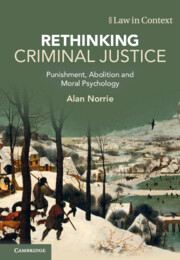Book contents
- Rethinking Criminal Justice
- Law in Context
- Rethinking Criminal Justice
- Copyright page
- Dedication
- Epigraph
- Contents
- Preface
- Acknowledgements
- 1 Criminal Justice and the Metaphysical Animal
- Part I Two Routes Beyond Political Theory
- Part II Moral Psychology, Law and the Metaphysics of Forgiveness
- Part III Guilt and the Animal that Thinks and Loves
- Part IV Three Case Studies
- Part V Mature Retributivism as Abolition
- References
- Index
- References
References
Published online by Cambridge University Press: 17 May 2025
- Rethinking Criminal Justice
- Law in Context
- Rethinking Criminal Justice
- Copyright page
- Dedication
- Epigraph
- Contents
- Preface
- Acknowledgements
- 1 Criminal Justice and the Metaphysical Animal
- Part I Two Routes Beyond Political Theory
- Part II Moral Psychology, Law and the Metaphysics of Forgiveness
- Part III Guilt and the Animal that Thinks and Loves
- Part IV Three Case Studies
- Part V Mature Retributivism as Abolition
- References
- Index
- References
Information
- Type
- Chapter
- Information
- Rethinking Criminal JusticePunishment, Abolition and Moral Psychology, pp. 299 - 307Publisher: Cambridge University PressPrint publication year: 2025
